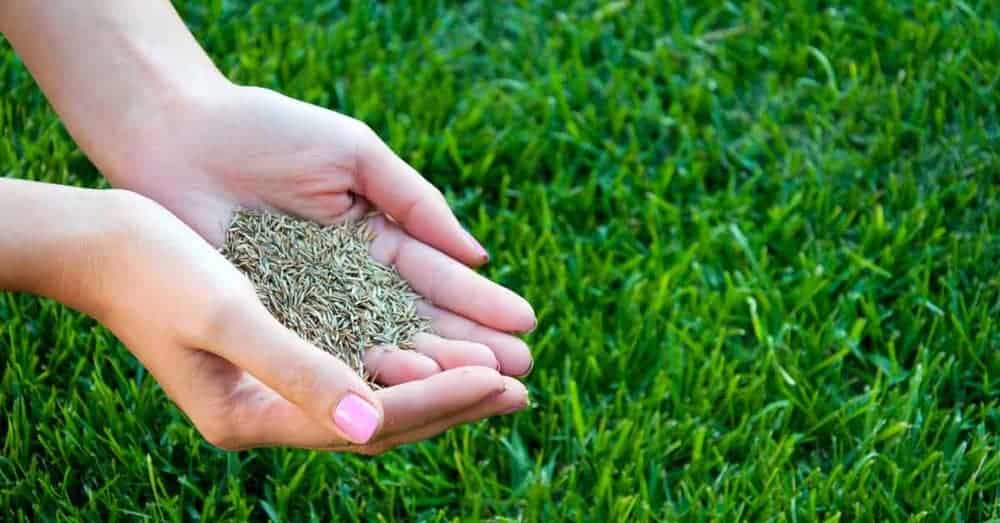When should I sow grass seeds on my lawn? My friend Loren asked me this question the last time when we met. Basically, it was her first time making a new lawn, and she was pretty much confused about the best time for sowing seeds.
Thankfully, she thought about this fact before sowing seeds. In fact, most beginners don’t even think about the time and just spread the seeds anyway. However, you should always remember that grass seeds may not germinate and grow if they don’t get the appropriate temperature.
However, Loren’s attempt to make a lawn for the first time was a success. It’s because she managed to choose the best time to start and make a proper ground preparation. However, I am sure that many of you don’t have a complete idea about when you should sow grass seeds and when you should not.
Indeed, grass seeds are of different types based on their preferred temperature. So, you can’t plant cool-season grass seeds in summer and vice versa. Well, if you don’t know when you should plant what type of seeds, I am sure that you are in the right place. Today, I am going to share some important information about this fact. So, stay connected to the end.
Why Timing Matters to Sow the Seeds for A Lawn
 In general, the nourishment and the growth of lawn grasses vary in different climate preferences. And it grows fastest if the planting season aligns with the grass seeds’ intrinsic periods of active growth.
In general, the nourishment and the growth of lawn grasses vary in different climate preferences. And it grows fastest if the planting season aligns with the grass seeds’ intrinsic periods of active growth.
As maintaining time is essential to sow seeds for the lawn, cool-season grasses certainly require some specifications in different areas. These types of lawn grasses cannot stay green and fresh in summer.
However, things are the same for warm-season grass as well. It requires a very hot temperature and a dry climate. The amount of nutrition level and the way the grass stands firm depends mostly on the timing of their planting.
In addition, if warm-season grass is planted in chilly winter, it is not possible for the soil to keep the same moisture. Similarly, the winter-season grass might not propagate well in warm air temperatures. So, you must learn about the best time for sowing seeds if you want a long-term lawn.
Types of Grass Based on Temperature-preference
 As you know that temperature plays a vital role in growing grass on your seed, you have to be very careful when choosing the type of grass. Generally, you can differentiate grass seeds into two types based on their preferable temperature. Well, we can share a list of the grass seeds for cool and hot seasons.
As you know that temperature plays a vital role in growing grass on your seed, you have to be very careful when choosing the type of grass. Generally, you can differentiate grass seeds into two types based on their preferable temperature. Well, we can share a list of the grass seeds for cool and hot seasons.
Types of hot-weather Grass Seeds
- Centipede grass
- Bermuda grass
- Bahia
- Zoysia grass
- St. Augustine grass
Types of cold-weather grass seeds
- Rough bluegrass
- Creeping fescue
- Tall fescue
- Fine fescue
- perennial ryegrass
- Kentucky bluegrass
Here, all the grass types have their exceptional color and texture. They even come with different looks and shapes. So, to choose the type of grass, you have to be careful about that. Besides, make sure to learn about their basic criteria to choose the appropriate one for your lawn. And the best time for sowing seeds is mandatory to think about.
Best Time for Cold Weather Grass Seeds
 Cold weather grass seed generally requires a moderate soil temperature between 50 to 60 degrees Fahrenheit. And during the daytime, the air temperature needs to be around 60°F to 75°F. It would be best to check the temperature with a soil thermometer and sort out the guesswork.
Cold weather grass seed generally requires a moderate soil temperature between 50 to 60 degrees Fahrenheit. And during the daytime, the air temperature needs to be around 60°F to 75°F. It would be best to check the temperature with a soil thermometer and sort out the guesswork.
Early Autumn is considered to be the best time to sow the cool-season grasses. And of course, there are several advantages, and the soil still remains warm from the summer temperature. Therefore, the daytime warmth and cool evenings help to germinate the newly sown seeds faster than ever.
The newly planted seeds require balanced soil moisture, and Fall brings additional precipitation. Undoubtedly, it lessens the chance of drying out the cool-season seeds. And using water-conservant grass seeds, the owners do not need to water often.
The second best time for sowing seeds is Spring because the air and soil temperature warms back and early spring rain and late-melting snow keep the soil wet. It gives extra advantages to the early weeds; grasses get a few times to settle in prior high temperatures that preclude germination.
Besides, the area to the north and the fall temperature help with ideal planting time. And for transition zone lawn owners in northern Arkansas and in central, the suitable time is September and October for seeding cold-weather grass.
Best Time for Hot Weather Grass Seeds
 Hot-weather grass seeds germinate the best in the soil temperature in the range of 65°F to 70°F. And it changes in the daytime to approximately 80°F. Here, early summer and late Spring is a more encouraging time for the warm season grass as it gives the advantage of early rain and warm soil.
Hot-weather grass seeds germinate the best in the soil temperature in the range of 65°F to 70°F. And it changes in the daytime to approximately 80°F. Here, early summer and late Spring is a more encouraging time for the warm season grass as it gives the advantage of early rain and warm soil.
In General, the sowing of warm-season grasses should be planted 90 days before the snowfall. As it can not germinate below 55°F, it needs a natural boost and a full season to stand firm for the rest of the winter.
The sowing time of hot weather grass seeds also differs by location. For instance, mid-April to mid-may is the best time for sowing seeds in California and nearby areas. Likewise, lawn owners in central and southern Arkansans seed during late May and June.
FAQ
Q: What month is best to put grass seed down?
A: September is the best month to put grass seed down. In September, the temperature is approximately 60 to 75 degrees. It is the best time for sowing seeds. This kind of temperature allows seeds to germinate properly.
Q: Is April too early to plant grass seed?
A: No, April is not too early to plant grass seeds. If you choose Spring to sow seeds, you can simply try it in April. The temperature this month is good for seed germination.
Q: What temperature is too cold for grass seed?
A: 50°F is too cold for sowing grass seeds. If the temperature of the daytime in your region is below 60°F, you shouldn’t sow seeds at this temperature. Eventually, the temperature inside the soil is lower than 50°F in this situation. In this case, the seed cannot germinate properly.
Q: Will grass seed germinate if nights are cold?
A: Grass seed cannot germinate if nights are colder than 50°F. When the night is this much colder, the temperature inside the soil is even lower. So, the seed will get frozen, and it will be difficult for them to germinate.
Q: Can I sow seed in summer?
A: You can sow seeds in summer if it is not too hot outside. If the temperature outside is more than 75°F, the seeds can be rotten so that they won’t germinate. So, it is better to sow seeds in Spring or Autumn.
Final Verdict
I am sure that you have understood why it is essential to sow grass seeds at the right time. You have already learned about the cold and warm-season grass types as well. Still, whatever seeds you are planning to sow, Spring and Autumn must be the best time for sowing seeds.
So, if you are not sure of what type of seeds you bought, just keep them in your storage and sow them in Spring or Autumn. I am sure that you will get a perfect result. Also, you should prepare the ground of the lawn properly before sowing seeds.
Here, the discussion is ended, and let me take my leave. I have an aim to help and encourage people to make their lawns. And that’s why I am sharing my knowledge and experience with my lawns with you all. Thank you for supporting me in my journey. Take care.
